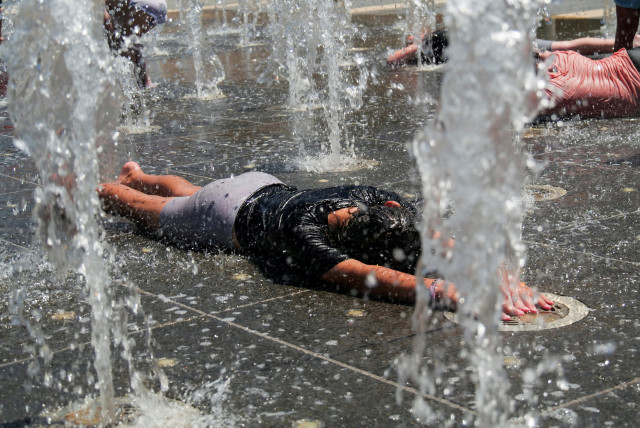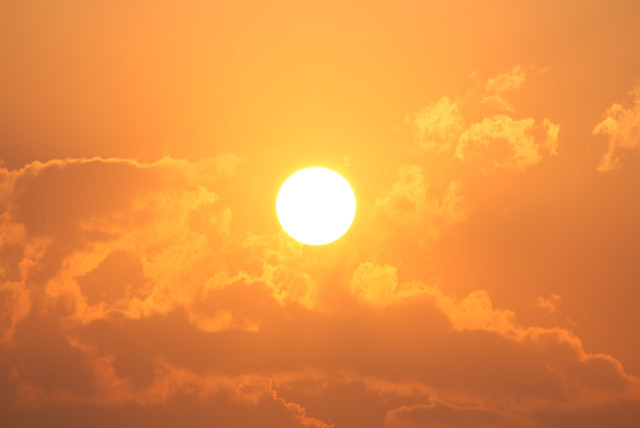Heatwave grips Israel: Temperatures soar, experts warn of dire outcomes

Israel was faced with a major heatwave on Saturday that was expected to continue into Sunday as well.
Israelis were sweltering on Saturday, with temperatures crossing 40°C in some parts of the country, and the Meteorological Service warning that Sunday would be even worse.
"A significant rise in temperatures is expected mainly inland and in the mountains, becoming hot and dry up to very hot and dry," the service said on its website. "Muggy along the coast. A significant rise in heat stress is expected, and in most regions, heavy to extreme heat stress will prevail."
Although the service did say that on Sunday, isolated light rainfall in the east and south could help break the spell.
The Nature and Parks Authority banned lighting fires in nature reserves and national parks over the weekend due to the danger of wildfires. Instead, it encouraged visitors to take short hikes on shaded trails. The authority said some parks would be closed due to the extreme weather conditions.
Health authorities advised the general population to refrain from sun exposure during peak hours, stay well-hydrated, and pay special attention to the well-being of children and older people.
The latest heatwave comes after Israel experienced nearly three consecutive weeks of extreme heat in July.
"This should be a wake-up call for the world," said Shani Rohatyn-Blitz, coordinator of the KKL-JNF Forestry Division. "Heat records are being broken worldwide, especially in the Mediterranean basin. We are witnessing how model predictions of more extreme climate events are coming true before our eyes."
While Israel has yet to set any new long-standing temperature records, the World Meteorological Organization has verified that the worldwide average temperature for July 2023 was the highest recorded for any month. It exceeded the July average from 1991-2020 by 0.72°C and surpassed the previous record set in July 2019 by 0.33°C.
Estimates indicate that the temperature for the month was approximately 1.5°C higher than the average temperature between 1850 and 1900.
Heatwaves around the world are leading to devastating fires
In recent weeks, Israel dispatched rescue missions to aid in tackling the massive fires that devastated Cyprus. Significant blazes flared up in Portugal, resulting in the evacuation of over a dozen villages. Wildfires also scorched through parts of Spain.
A wildfire in Maui has tragically claimed the lives of over 80 individuals.
In Alaska, Juneau witnessed a two-story house collapsing and being carried away by a river due to severe floods caused by a glacier melting in a nearby lake.
In a report published last month, the Barcelona Institute for Global Health revealed that 61,672 individuals succumbed to heat-related fatalities in Europe during the previous summer. The report also projected that if temperature trends persist, Europe might encounter an average of 120,000 untimely deaths due to heat each summer by the year 2050.
"When we're exposed to hot temperatures for too long, the body is naturally going to want to try it and cool itself," explained Dr. Joy Shumake-Guillemot of the World Meteorological Organization during a "Science in 5" World Health Organization podcast last month. "It's going to kick into a biological process where the skin is going to send a signal to the brain to dilate the blood vessels and try to get rid of this excess heat. And if that doesn't work, then the body is going to start sweating.
"And if that doesn't help enough, well, your temperature's going to continue to rise. And with an increasing internal temperature, then you're going to start to experience symptoms of heat exhaustion."
Shumake-Guillemot said that heat exhaustion causes weakness and dizziness and can result in headaches and nausea, eventually progressing to heatstroke.
While individuals in the higher-risk categories, such as older adults, pregnant women, children, infants, individuals with preexisting medical conditions, and outdoor workers, face the most significant susceptibility to heatstroke, Shumake-Guillemot emphasized that even young and generally healthy people can be affected by elevated temperatures.
"If you're exercising outdoors when it is too hot, you can be affected," she said. "Workers who are out in the heat for long periods can be affected. And this is because the working muscles are creating additional heat in the body, and the body has to work twice as hard to get rid of this extra heat.
"We also see a hotspot for cases of heat illness happen to be at festivals and outdoor gatherings like music concerts," Shumake-Guillemot added.
She pointed out that seeking refuge indoors only sometimes guarantees safety, as indoor temperatures occasionally surpass those outside. She suggested that during periods of extreme heat, it's advisable to find shelter outdoors in shaded areas.
How about using a fan?
Most of the time, that's helpful, Shumake-Guillemot said. However, "in really hot conditions when it's over 40 degrees, 104°F, then using a fan can actually make things worse and can accelerate heating in the body instead of cooling it down."
The Environment and Climate Change portal is produced in cooperation with the Goldman Sonnenfeldt School of Sustainability and Climate Change at Ben-Gurion University of the Negev. The Jerusalem Post maintains all editorial decisions related to the content.
Jerusalem Post Store
`; document.getElementById("linkPremium").innerHTML = cont; var divWithLink = document.getElementById("premium-link"); if (divWithLink !== null && divWithLink !== 'undefined') { divWithLink.style.border = "solid 1px #cb0f3e"; divWithLink.style.textAlign = "center"; divWithLink.style.marginBottom = "15px"; divWithLink.style.marginTop = "15px"; divWithLink.style.width = "100%"; divWithLink.style.backgroundColor = "#122952"; divWithLink.style.color = "#ffffff"; divWithLink.style.lineHeight = "1.5"; } } (function (v, i) { });


